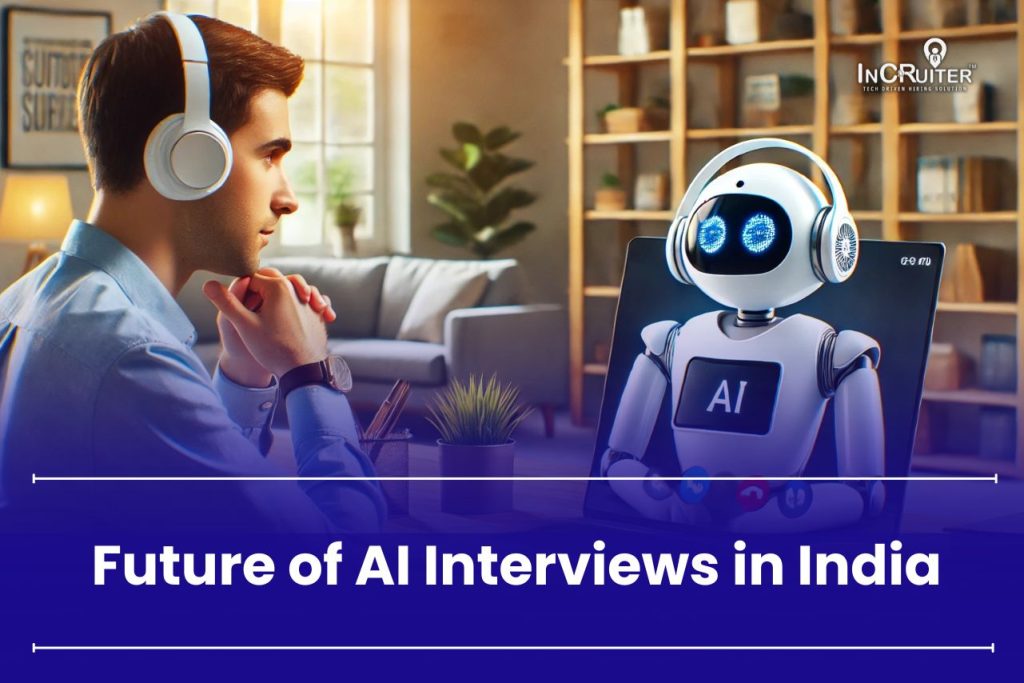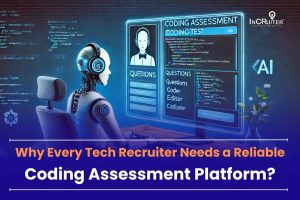
India is on track to become the largest provider of digital talent by 2030, according to industry reports. As businesses scale and roles become more dynamic, hiring needs are evolving at a rapid pace. The traditional process of screening resumes and conducting multiple manual interviews is no longer sustainable. A shift toward AI interviews is already underway.
This is not just a passing trend. AI interviews are becoming the new standard in recruitment, offering structure, speed, and deeper insights into candidates. For a country as diverse and populous as India, this evolution is not optional. It is essential.
From handling large volumes of applicants to reaching candidates in remote locations, India faces a unique set of hiring challenges. These include wide language diversity, inconsistent digital infrastructure, and limited access to qualified interviewers across sectors. Artificial intelligence is proving to be the answer not by replacing human judgment, but by enhancing it with data, fairness, and scale.
In this blog, we explore how India is embracing AI in interviews across various industries, the technologies powering this shift, and how platforms like InCruiter are helping define the future of recruitment in India.
Top Countries fueling the AI revolution around the world
| Rank | Country | AI Investment (USD) |
| 1 | European Union | $214 billion |
| 2 | France | $116.6 billion |
| 3 | United States | $109.1 billion |
| 4 | China | $9.3 billion |
| 5 | India | $8 billion |
| 6 | United Kingdom | $4.5 billion |
Artificial Intelligence is no longer just a trend. It is a global priority. Countries across the world are investing billions to reshape everything from healthcare to defense. One area experiencing a quiet yet powerful transformation is hiring, particularly in the way interviews are conducted. To understand where the future of interviews is headed, we need to examine which nations are investing in their development.
In 2025, the European Union is leading global AI development with more than 200 billion euros committed. France follows closely, with an investment of 109 billion euros, and the United States is investing over $ 109 billion. These countries are not just funding research. They are creating real solutions. This includes automated interviewing platforms, conversational AI tools for candidate interaction, and technology to ensure authenticity during virtual assessments.
China is investing around $ 9.3 billion, and the United Kingdom stands at $ 4.5 billion. While these numbers are lower, the focus is shifting toward targeted innovation. Meanwhile, India has committed $ 8 billion. Although the number is smaller compared to Western counterparts, India is utilizing it effectively across healthcare, education, public infrastructure, and recruitment automation.
Why does this matter for hiring?
These investments reveal a global shift toward smarter and faster recruitment. Countries are racing to develop systems that enhance accuracy, mitigate bias, and scale interviews to accommodate high volumes. Whether it is a bank in Paris or a tech startup in California, AI interviews are replacing the traditional screening process. And India, with its young workforce and growing digital push, is poised to become one of the key players in this transformation.
Now that we have a global perspective, let us examine how India is preparing for the future of AI interviews.
Also read: InCruiter’s AI Interviewer: How It Stands Out from Other AI Interviewing Platforms
India’s Growing Investment Signals the Future of AI Hiring
India is not just observing the global shift toward artificial intelligence. It is preparing to lead it. With more than 900 million people of working age expected by 2030, according to the World Bank, India will have the largest talent pool in the world. This also brings a huge challenge. Companies across sectors need to screen and evaluate millions of candidates each year across languages, regions, and job functions. Traditional interviews are simply not designed for this scale.
Recruiters in India spend more than 60% of their time on repetitive early-stage tasks like resume screening and basic interviews, according to Deloitte India. These processes are often time-consuming and fail to highlight real candidate potential. Artificial intelligence-powered interviews solve this by automating assessments for communication, technical skills, and problem-solving. According to a study by Nasscom and BCG, AI platforms can now conduct more than n-numbers of interviews per recruiter per day using conversational engines and intelligent feedback.
AI interviews are also expanding access in smaller towns. Government data shows that over 45% of job seekers in tier-2 and tier-3 cities lack access to structured hiring. With AI tools available through mobile devices, more candidates are being reached than ever before. Meanwhile, national programs like Digital India are building public infrastructure to support these solutions.
As private and public sectors embrace automation in hiring, artificial intelligence interviews are becoming essential to ensure speed, fairness, and scale in the Indian recruitment landscape.
Sector Spotlight: How Indian Industries Are Using AI Interviews?
As artificial intelligence becomes more integrated into hiring workflows, Indian industries are rapidly shifting from manual interviews to intelligent screening solutions. This change is not only driven by technology trends but by real business needs across sectors. From startups to state bodies, AI interviews are solving unique hiring challenges at scale.
Information Technology and Startups
India’s technology sector is expected to employ over 10 million people by 2025, according to NASSCOM. Tech companies and startups face constant pressure to hire fast and hire right. AI interviews are helping them screen developers through real-time coding tasks, behavioral evaluations, and role-specific scenarios. Platforms are now able to handle over 1000 interviews daily using intelligent question generation and scoring. This has reduced time to hire by more than 60 percent in several tech firms.
Banking, Financial Services, and Insurance
The BFSI sector hires lakhs of candidates annually for both operations and customer-facing roles. AI interviews are now being used to assess candidates for risk compliance knowledge, communication skills, and ethical decision-making. Companies are using structured scoring models to meet regulatory standards while scaling recruitment. A Deloitte India report notes that 45 percent of BFSI firms have already adopted AI-led recruitment tools in at least one hiring process.
Healthcare and Pharmaceuticals
With the healthcare industry projected to grow to 372 billion dollars by 2026, according to IBEF, the demand for skilled professionals is rising sharply. Hospitals and pharma companies are using AI tools to conduct scenario-based interviews for nursing, clinical support, and medical sales. These interviews simulate real medical scenarios, assess urgency in decision making, and ensure the right temperament. AI also allows multilingual support, a major plus in rural recruitment.
Education and EdTech
India’s EdTech market is growing at a compound annual growth rate of 39 percent and is expected to reach 30 billion dollars by 2031. EdTech firms are hiring teachers, sales consultants, and content creators remotely. AI interviews are used to evaluate teaching communication, classroom scenario handling, and subject knowledge. With automatic feedback and faster onboarding, companies like Byju’s and Vedantu have scaled hiring without compromising on candidate quality.
Government and Public Sector
Government hiring in India often involves a high volume and requires strict fairness. AI interviews are being used in programs like Skill India and other digital recruitment initiatives to standardize evaluations. With more than 10 crore candidates applying for central and state jobs each year, automated interviews help ensure transparent and bias-free screening. AI systems also support interviews in regional languages, making public hiring more accessible.
Also read: From Screening to Selection: How AI Interview Bots Are Transforming the Hiring Process
Technology Fuels the Growth of AI Interviews
India is stepping into a new era of hiring. At the center of this shift are intelligent technologies that make artificial intelligence interviews more accurate, scalable, and accessible. From personalized interviews to secure assessments, these tools are enabling a future-ready recruitment process. With India expecting over 900 million working-age individuals by 2030, according to the World Bank, companies are now relying on technology to transform outdated hiring practices and build efficient, fair, and intelligent interview experiences.
Generative AI: Real-Time Interview Personalization at Scale
Generative AI plays a critical role in modern recruitment by creating personalized interview questions based on job descriptions and candidate profiles. Instead of repeating standard formats, the system adapts in real time to assess role-specific capabilities. A study from IBM shows that generative models increase question relevance by up to 60 percent. In India, this technology is now being used to tailor questions for diverse functions such as marketing, sales, and engineering, offering candidates a more accurate and dynamic evaluation experience.
Conversational AI: Delivering Natural and Engaging Interview Experiences
Conversational AI helps simulate real conversations during interviews. It asks follow-up questions, interprets context, and creates a fluid dialogue that reflects real workplace situations. This is especially valuable in customer service and sales roles. According to Nasscom, India’s conversational AI market is growing at more than 20 percent annually. Employers are now using this model to assess soft skills, objection handling, and real-time decision making, all while maintaining a structured and data-driven scoring process.
Multimodal AI: Evaluating Candidates Through Voice, Video, and Text
Multimodal AI uses data from multiple sources such as voice tone, facial expression, and speech content to assess a candidate. This technology is particularly useful in India’s healthcare, education, and hospitality sectors. A Stanford study revealed that multimodal systems improve soft skill assessment accuracy by more than 30 percent. By evaluating both verbal and non-verbal communication, companies in India can now make more informed decisions, especially when hiring for roles that require empathy, presentation, or trust building.
Ethical AI: Building Bias Free and Inclusive Interviews
Ethical AI protects fairness in interviews by removing identity markers and focusing only on merit. In a country as diverse as India, where language, gender, and regional bias can influence decisions, this is vital. A PwC report found that ethical AI improves diversity in hiring shortlists by 35 percent. Organizations are now prioritizing this model to ensure that every applicant receives a fair chance, especially during campus placements and public recruitment drives across different states and regions.
Explainable AI: Bringing Clarity and Trust to Interview Outcomes
Explainable AI allows recruiters and candidates to understand how scores are generated. Each response is analyzed, and the system offers clear insights such as “Answer lacks depth” or “Communication was strong.” According to Harvard Business Review, this transparency increases recruiter trust in AI tools by over 40 percent. In India, where hiring decisions often require audit trails and internal reporting, explainable AI is becoming a core part of enterprise recruitment strategies, especially in regulated industries like banking and insurance.
Edge AI: Empowering Rural and Remote Hiring in India
Edge AI solves the connectivity challenge by processing interviews on the device itself. It enables companies to reach candidates in tier two and tier three cities where internet access is limited. IDC reports that more than half of Indian enterprises are investing in edge technologies. This is helping recruiters conduct interviews in real time and sync data later, improving access to jobs and reducing hiring gaps in underserved regions, without compromising on the quality or depth of assessment.
Vertical AI: Powering Sector-Specific Hiring at Scale
Vertical AI refers to systems trained on industry-specific knowledge. It ensures that interviews for finance, healthcare, or education roles are relevant and practical. Deloitte research shows that vertical AI improves hiring accuracy by 45 percent through domain-aware assessments. In India, where every sector operates differently, this model allows recruiters to test actual job readiness instead of generic abilities. It has already shown success in hiring retail staff, customer support agents, and healthcare workers with improved efficiency.
AI in Cybersecurity: Ensuring Secure and Authentic Interviews
Security is a growing concern in remote interviews. AI in cybersecurity monitors candidate behavior, screen movement, and sound patterns to detect possible impersonation or external help. With India witnessing a rise in online hiring fraud, according to CERT-In, such solutions are becoming essential. These systems help protect hiring data, ensure interview authenticity, and safeguard company reputation. They also build candidate confidence by showing that every interview is monitored and scored on fair, secure standards.
Also read: How Conversational AI is Revolutionizing One-Way Video Interviews?
Challenges and Concerns in the Indian Context
While artificial intelligence interviews offer enormous potential for the future of hiring in India, there are still several roadblocks that need attention. These challenges are not just technical in nature, but also social and infrastructural. For AI interviews to become widely adopted and effective across all sectors, it is important to address the issues that affect both employers and candidates. The following concerns highlight the realities companies are facing on the ground as India moves forward with AI-driven hiring.
Digital Literacy Gaps Among Candidates and Recruiters
Digital literacy remains a major challenge across India, especially in semi-urban and rural regions. According to the National Sample Survey Office, less than 30 percent of rural households have access to digital devices and reliable internet. Many candidates are still not comfortable navigating AI tools, video platforms, or online assessments. On the employer side, some recruiters also lack the training to interpret AI-based results effectively. This gap reduces adoption and creates mistrust in AI technology during recruitment.
Resistance to Replacing Human Interviewers
Human connection has always played a vital role in interviews. Many companies still believe that human intuition is necessary for cultural fit and character evaluation. This mindset creates resistance when introducing automated interview systems. In a recent survey by SHRM India, 48 percent of hiring managers reported discomfort in trusting automated interview decisions. Overcoming this concern requires strong change management, training, and proof of success through structured AI-human collaboration models.
Data Privacy and Candidate Consent Challenges
The collection of video responses, behavioral data, and voice recordings during AI interviews raises valid concerns around privacy. Many candidates are hesitant to provide consent due to the fear of data misuse. India does not yet have a fully implemented data protection law, although the Digital Personal Data Protection Act was passed in 2023. Without clear regulation, companies must follow global best practices to ensure secure storage, candidate consent, and ethical use of recorded interview data.
Infrastructure Limitations in Remote Hiring Locations
Although India has made strong progress in digital connectivity, infrastructure gaps remain a concern. Many villages and remote towns still face frequent electricity outages, limited internet access, and low device penetration. A report by TRAI states that only 47 percent of rural areas have stable internet connectivity. This limits the reach of AI interviews and makes real-time assessments difficult to execute in some regions. Edge computing and offline interview modes are helping, but infrastructure investment is still needed.
Absence of Strong Government Regulations
AI in hiring is evolving faster than the regulations that govern it. While India has released ethical AI frameworks under NITI Aayog, there is still no unified national policy on the use of AI for recruitment. Without clear legal boundaries, companies must self-regulate and follow global standards to avoid bias, discrimination, and data misuse. As AI becomes central to national skilling and employment programs, the need for policy-level clarity and accountability will become increasingly urgent.
Also read: How Can AI Interview Software Help Companies with Large Numbers of Applications?
What the Future Looks Like? (2025 to 2030)
By 2030, artificial intelligence interviews are expected to become the default method for preliminary screening across Indian companies. These tools will work alongside human panels, creating AI plus human hybrid models that balance automation with emotional intelligence. As digital hiring grows, even semi-skilled and blue-collar jobs will see widespread use of AI tools for screening. India, with its growing technology talent and cost advantage, is also expected to emerge as a global hub for Interview as a Service exports. AI interview software will be deeply integrated with job portals, applicant tracking systems, and learning platforms, making hiring seamless, fast, and data-driven. The next five years will define how India sets the global benchmark in AI-based recruitment.
InCruiter’s Vision: Leading India’s Interview Revolution
InCruiter envisions a future where interviews in India are faster, smarter, and more inclusive, powered by the right mix of human insight and intelligent automation. Through its core offerings like Interview as a Service, AI-powered interview tools, video interview platforms, and automated scheduling software, InCruiter is building the foundation for scalable and structured hiring. These solutions allow companies to focus on decision-making while technology handles consistency, speed, and accuracy. InCruiter believes the future of hiring is not just digital, but deeply human at its core. Its vision is to position India as a global force in redefining how the world conducts interviews, driven by innovation, fairness, and purpose.
Conclusion
The future of hiring in India is not about choosing between humans and machines; it’s about leveraging both. It is about combining the strengths of both. AI interviews are not here to replace recruiters. They are here to empower them with deeper insights, faster decisions, and more consistent evaluations. As job markets grow more competitive and candidate volumes rise, Indian companies must adopt intelligent interview solutions to stay ahead. The time to modernize recruitment is now.
Start transforming your hiring process with InCruiter AI-powered interview solutions today.
Ready to Transform Your Hiring Process?
Discover how our AI-powered interview platform can streamline your recruitment and find the best candidates faster.





